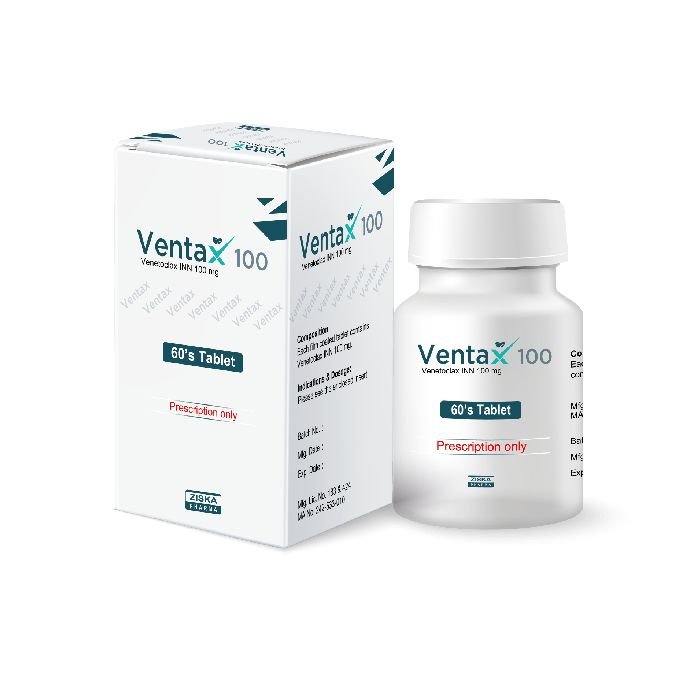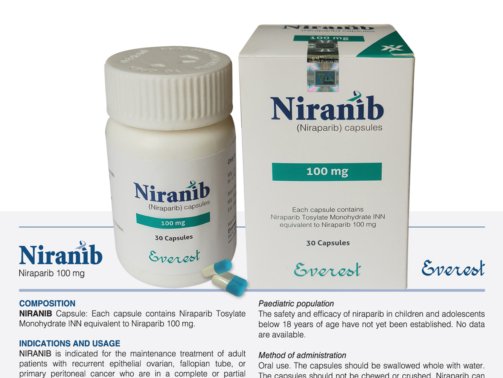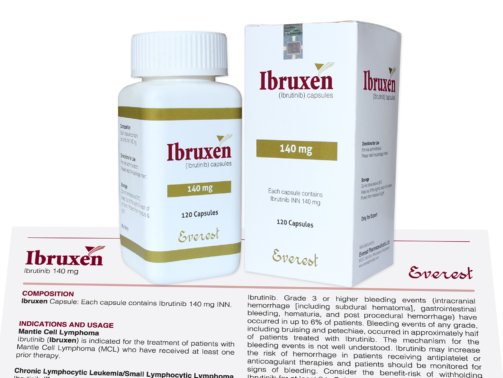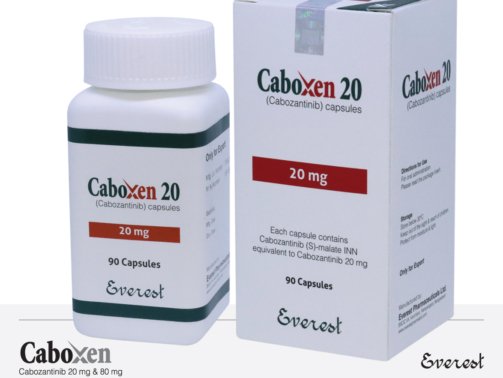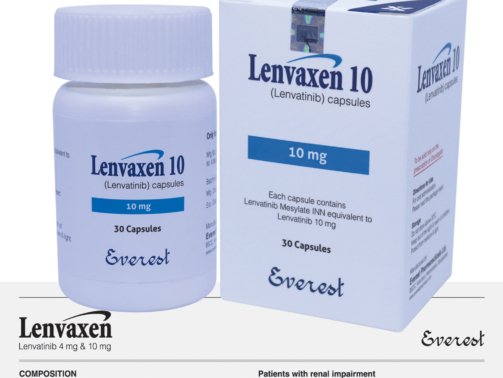Venetoclax (Venclexta) 100 mg
0.00$
Ventax (Venetoclax) 100 mg is a medication used in the treatment of certain types of blood cancers, particularly chronic lymphocytic leukemia (CLL) and acute myeloid leukemia (AML). It belongs to a class of drugs known as B-cell lymphoma-2 (BCL-2) inhibitors, which work by blocking the activity of the BCL-2 protein, promoting programmed cell death (apoptosis) in cancer cells. Ventax 100 mg offers a targeted therapy option for patients with specific types of leukemia, helping to inhibit cancer cell growth and improve treatment outcomes.
Venetoclax, ingrained as Venclexta, is a tradition drug that’s generally used in the treatment of certain types of blood cancer. Venetoclax is available in different strengths 10 mg, 50 mg, and 100 mg tablets, and the 100 mg is generally used within the duration of continued remedy. Venetoclax has changed the face of habitual lymphocytic leukemia( CLL), small lymphocytic carcinoma( SLL), and acute myeloid leukemia( AML) treatment, especially in individualities who aren’t suitable for ferocious chemotherapy.
Mechanism of Action
Venetoclax is a picky B- cell carcinoma- 2( BCL- 2) asset. BCL- 2 is a protein that inhibits apoptosis( programmed cell death) of certain cancer cells, making them live and gain veritably fleetly out of control. Inhibiting BCL- 2 by Venetoclax triggers the normal death of cancer cells, restoring the body’s cell regulation function to normal, and reducing the overall cargo of cancer.
Indications
Venclexta 100 mg is employed alone or combined in the following habitual Lymphocytic Leukemia( CLL) With or without omission of 17p, alone as a monotherapy or in combination with obinutuzumab or rituximab.
Small Lymphocytic Carcinoma( SLL) As in CLL, Venetoclax can be employed alone or in combination with other specifics.
Acute Myeloid Leukemia( AML) In recently diagnosed cases aged 75 times or aged and in cases with comorbidities that render ferocious induction chemotherapy unhappy. Venetoclax is most generally used with azacitidine, decitabine, or low- cure cytarabine.
Dosage and Administration
Treatment with Venetoclax (Venclexta) 100 mg should generally be started with a cure ramp- up authority to reduce the threat of excrescence lysis pattern( TLS), a dangerous and potentially fatal complication. The 100 mg tablets are generally employed in the ultimate phase of this ramp- up and as a conservation cure
For CLL/ SLL remedy is begun at 20 mg and rises accretive during five weeks to a diurnal standard cure of 400 mg. The 100 mg tablet becomes essential in this increase( week 3 100 mg; week 4 200 mg; week 5 400 mg).
For AML Venetoclax is started at 100 mg or 200 mg grounded on what medicine it’s taken with and is taken formerly daily for 28- day cycles.
Venclexta tablets should be taken orally with food, and the tablets should be swallowed whole and not masticated, crushed, or broken.
Precautions and Warnings
Important preventives should be observed when taking Venetoclax
Excrescence Lysis Pattern( TLS) TLS is a dangerous side effect, particularly during inauguration of remedy. Close monitoring, precautionary hydration, and treatment with uric acid- lowering agents( e.g., allopurinol) should be employed.
Neutropenia and Infection Venetoclax causes low white blood cell situations, which raise the threat of infection. Blood counts must be covered.
Hepatic Impairment: Cure adaptation in hepatic impairment can be demanded.
medicine relations CYP3A impediments( e.g., ketoconazole, grapefruit juice) increase Venetoclax blood attention vastly, raising the threat of toxin. Avoidance or conservative combination administration is judicious.
Gestation and Lactation Venetoclax can beget fetal detriment and shouldn’t be employed in gestation. travail-aged ladies should employ effective contraception during treatment and for a period of time after the last cure.
Side Effects
Blessed to utmostanti-cancer medicines, Venetoclax can beget several side effects, including serious bones
Common Side Goods
Diarrhea
Nausea
Fatigue
Anemia
Neutropenia
Upper respiratory infections
Serious Side goods
Excrescence lysis pattern( TLS)
Severe infections( similar as pneumonia and sepsis)
Febrile neutropenia
Abnormalities in liver function
Cases should incontinently inform their treating doctor if they develop any fever, chills, bruising or bleeding at unusual spots, or weakness.
Storage and Handling
Venclexta 100 mg tablets should be stored at room temperature, between 20 °C to 25 °C( 68 °F to 77 °F), in a dry place, down from humidity and heat. Store the tablets in the original package to cover them from light and moisture. As with all specifics, store out of the reach of children and faves.
Patient Counseling Information
Healthcare providers should educate cases the significance of
Follow the ramp- up schedule.
Informing signs of TLS or infection.
Avoiding strong CYP3A impediments or corrupters .
Not changing the lozenge without medical discussion.
Attending all follow- up blood tests and check- ups.
Conclusion
Venetoclax( Venclexta) 100 mg is an effective, targeted remedy with significant benefits in the treatment of hematologic malice. Its medium of BCL- 2 inhibition is a revolutionary way of restoring programmed cell death in cancer cells. Despite the medicine’s adverse goods similar as TLS and neutropenia, with proper monitoring and adherence to guidelines, Venetoclax has shown encouraging results in clinical trials as well as in factual practice.
Always consult with an oncologist or hematologist before starting or changing Venetoclax treatment to insure its safe and effective use.
Order Now At Mdx Pharma bd….
To order from MDX Pharma BD, visit their website at https://mdxpharmabd.com, where you can browse products and place orders online. For inquiries or orders via email, contact emedicarepharma@gmail.com. Alternatively, call (+88) 01929123476. Their address is 29, Abdullahpur, Uttara, Dhaka-1230, Bangladesh.
1. What’s Venetoclax( Venclexta) 100 mg used for?
Venetoclax is used to treat certain types of blood cancers, including habitual lymphocytic leukemia( CLL), small lymphocytic carcinoma( SLL), and acute myeloid leukemia( AML) in some cases. It works by blocking the action of the BCL- 2 protein, which shields cancer cells.
2. How does Venetoclax work?
Venetoclax is a BCL- 2 asset. BCL- 2 is a protein that blocks cancer cells from witnessing programmed cell death( apoptosis). Venetoclax inhibits this protein so that cancer cells will naturally die.
3. How is Venetoclax 100 mg administered?
Venetoclax is administered orally formerly diurnal with food and water. The cure is generally initiated low and increased gradationally( ramp- up schedule) to minimize the threat of excrescence lysis pattern( TLS).
4. What’s Tumor Lysis Pattern( TLS) and how does it relate to Venetoclax?
TLS is an acute complaint caused by anover-lysis of excrescence cells. Venetoclax has the implicit to beget TLS, especially with treatment inauguration. To help it, cases are given hydration, specifics like allopurinol, and watchful monitoring.
5. Are there specifics that interact with Venetoclax?
Yes, Venetoclax is an commerce with CYP3A impediments( e.g., ketoconazole, erythromycin) and corrupters ( e.g., rifampin), as well as with P- gp impediments. The ultimate can affect Venetoclax situations and increase threat for toxin or reduce efficacity.
| Generic Name: | Venetoclax |
|---|---|
| Theraputic Category: | Anti-Cancer |
| Pack Size: | 60’s |

 Cart is empty
Cart is empty 